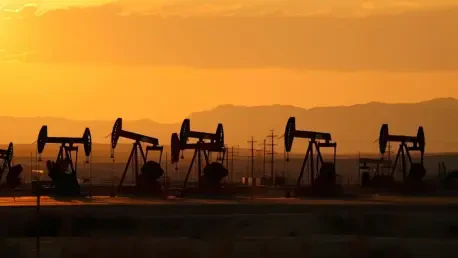Amid Tensions in the Middle East, Oil Prices Take a Surprising Turn
Recent military actions in the Middle East have led to significant fluctuations in oil prices, capturing global attention. An Iranian missile strike on a U.S. airbase briefly intensified fears of further conflict, but diplomatically nuanced responses appear to have lowered oil prices unexpectedly. These developments prompt questions about diplomacy’s role in calming volatile market dynamics and the potential for sustained peace.
The Ripple Effect of Geopolitical Movements on Oil
The geopolitical arena witnessed substantial upheaval when Iran launched a missile at a U.S. facility located in Qatar, fueling widespread anxiety about escalating military engagements. Despite the anticipation of retaliation and prolonged unrest, diplomatic overtures began to show promise in mitigating such fears quickly. Critical to the debate is the strategic significance of the Strait of Hormuz, a vital artery for global oil transportation. This chokepoint’s stability—or vulnerability—translates directly into market volatility, emphasizing its pivotal role in influencing oil dynamics worldwide.
How Financial Markets Responded to Changing Geopolitical Winds
Initially, investor jitteriness led to a surge in oil prices, with Brent crude spiking above $81 in light of U.S. and Israeli countermeasures. However, a swift decline followed as investor outlooks adjusted to possible thawing relations and reduced hostilities. Data revealed a Brent crude decrease of 2.77% to $69.50 and a U.S. crude drop of 2.85% to $66.57 per barrel. This market easing reflects perceptions that tension management might be underway, with investors cautiously optimistic about a reduced likelihood of major disruptions in oil supply.
Voices of Influence: What Do the Experts Say?
Insights from energy authorities and analysts shed light on the effectiveness of diplomatic strategies amidst heightened tensions. U.S. Energy Secretary Chris Wright highlights a narrative of peace through strategic fortitude, applauding the U.S.’s acknowledgment of Iran’s transparent communication ahead of the missile strike. Helima Croft, from RBC Capital Markets, supports this perspective, suggesting sustained diplomacy can stabilize oil markets. Yet, caution prevails, as U.S. Secretary of State Marco Rubio warns against complacency, underscoring the ever-present risks should Iran intensify its stance, particularly by threatening the Strait of Hormuz’s closure.
Maintaining Peace and Economic Stability in Unpredictable Times
The potential closure of the Strait remains a looming concern, necessitating proactive approaches to maintaining oil market stability. Nations might explore diplomatic frameworks emphasizing open dialogue and multilateral actions to foster sustainable peace. With Iran’s robust oil trade ties with China, it prompts compelling discussion on leveraging international relationships to curtail aggressive maneuvers, encouraging cooperative rather than confrontational stances. These strategies could pave the way for establishing longer-lasting harmony and economic prosperity across the region.
Diplomacy’s Influence on Oil Stability: Future Contributions
Diplomatic interactions appear instrumental in averting prolonged conflict in the Middle East, enabling a unique relief in oil market instability. The ease in tensions suggests that strategic diplomacy could play a critical part in managing geopolitical complexities, hinting at a hopeful path forward. The persistence of collaborative efforts and consistent diplomatic negotiations might hold opportunities for advancing peace and stability, potentially transforming volatile dynamics into predictable outcomes. The landscape ahead holds promise, suggesting that diplomacy could continue to shape, influence, and mitigate oil-related disputes toward a healthier economic environment.









